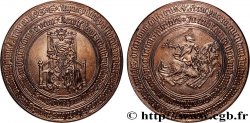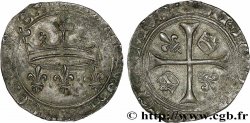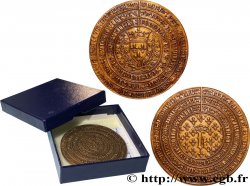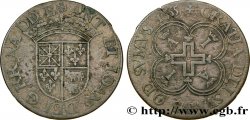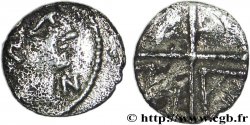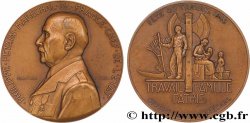Лицевая сторона
Аверс: легенда: + KAROLVS* FRANCORVM* REX* B.
Аверс: описание: Trois lis posés 2 et 1 sous une couronne fleurdelisée.
Аверс: перевод: (Charles, roi des Francs).
Обратная сторона
Реверс: легенда: + SIT* NOME* DNI* BENEDIT* .
Реверс: Описание: Croix fleurdelisée cantonnée aux 2 et 3 d’une couronne et d’une fleur de lis au 1 et 4.
Реверс: перевод: (Béni soit le nom du Seigneur).
Историческая справка
CHARLES VII LE BIEN SERVI / THE WELL-SERVED
(30/10/1422-22/07/1461)
Born in Paris in 1403, Charles was the son of Charles VI and Isabeau of Bavaria. On his accession to the throne, Charles VII was king only for the southern part of France (Anjou, Touraine, Berry, Marche, Bourbonnais, Auvergne, Forez, Languedoc). Normandy, northern Maine, Chartrain, Île-de-France, Champagne and Brie, Calais and Guyenne, Brittany and the Burgundian state (Duchy of Burgundy, counties of Flanders and Artois, Rethel, Nevers, Mâcon and Charolais ) recognized Henry VI as King of France and England. The Duke of Bedford, installed in Paris, had left the government of England to Beaufort and Gloucester. The "king of Bourges" had with him the houses of Bourbon, Orléans and Anjou-Provence. The first years of the war were indecisive. In 1428, the English decided to occupy Orléans and cross the Loire. It was then that Joan of Arc appeared, a young girl from Lorraine, who, having heard voices ordering her to free France from the English yoke, went to Chinon to Charles VII.. He was given men and weapons. On May 6, 1429, she launched the assault against the English stuck in front of Orleans and unblocked the city. On June 18, the French defeated the English at Patay, Troyes was reached on July 10; on the 17th, Charles was crowned in Reims. The towns of Champagne soon returned to the obedience of the legitimate sovereign. The winter campaign of 1429-1430 was less successful: the royal army failed before Paris. As for the Duke of Burgundy, he was now swinging between the two parties. In May 1430, Jeanne was taken by the Burgundians in front of Compiègne. They handed her over to the English for ransom. On May 30, 1431, after a witchcraft trial, the Maid was burned in Rouen. However, the French reconquest continued. In 1434, the Normans rose up against the English occupier. On November 12, 1437, Charles VII entered Paris. The "Burgundy" Parliament of Paris and the "Armagnac" Parliament of Poitiers merged. A truce was concluded in 1444 and broken in 1449. The reconquest of Northern France took place in one year (1449-1450). The English were definitively defeated at Formigny on April 15, 1450.. The conquest of Guyenne, faithful to its overseas sovereign, was more difficult. Bordeaux and Bayonne were taken in 1451, Bordeaux taken over by the English under Talbot in 1452. Finally, on July 17, 1453, at Castillon, Talbot was defeated and killed.. Bordeaux was definitively taken over in November 1453. Joan of Arc's rehabilitation trial took place in 1456. Now the Wars of the Roses paralyzed Albion. The Council of Constance (1414-1418) had put an end to the Great Schism by bringing to the pontifical throne Martin V (1417), who convened the Council of Basel (1431-1448). It was in this context that Charles VII promulgated the Pragmatic Sanction of Bourges (1438) which deprived the pope of the collation of ecclesiastical benefices and recognized the superiority of the Council over the sovereign pontiff.. The great seigniorial dynasties remained mistresses of half of the kingdom (Brittany, Foix, Armagnac, Albret, Burgundy). Their coalitions, such as the Praguerie of 1440, failed, despite the disagreement between Charles VII and his son, the Dauphin Louis. In this autumn of the Middle Ages, the royal monarchy was reborn stronger than ever. The English defeated, he still had to overcome the great feudal principalities.







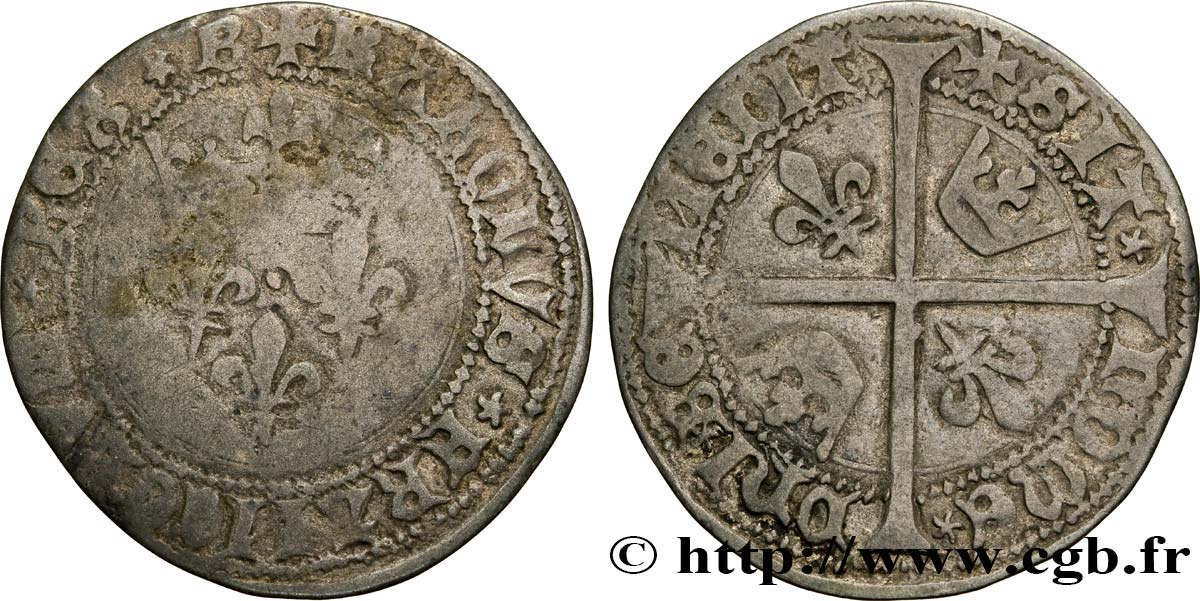
 Cообщить об ошибке
Cообщить об ошибке Распечатать страницу
Распечатать страницу Отправить мой выбор
Отправить мой выбор Задать вопрос
Задать вопрос Consign / sell
Consign / sell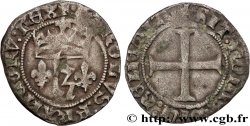
 Информация
Информация